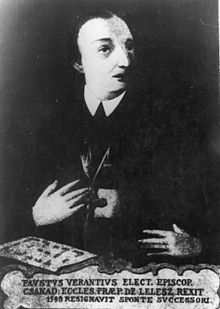Fausto Veranzio
| Fausto Veranzio Faust Vrančić |
|
|---|---|

Portrait of Fausto Veranzio
|
|
| Born | Šibenik, Republic of Venice (Present day Croatia) |
| Known for | Polymath, bishop |
| Notable work | Machinae Novae, Dictionarium quinque nobilissimarum Europæ linguarum |
Fausto Veranzio (Latin: Faustus Verantius; Croatian: Faust Vrančić; Hungarian and Vernacular Latin: Verancsics Faustus) (circa 1551 – January 17, 1617) was a polymath and bishop from Šibenik, then part of the Venetian Republic and today part of Croatia.
Fausto was born in Šibenik, Venetian Dalmatia into the family of counts Vrančić (Veranzio) who came from Bosnia (a branch of which later merged with Draganić family, creating the Counts Draganić-Vrančić), a notable family of writers and Berislavić family.
He was the son of Michele Veranzio, a Latin poet, and the nephew of Antonio (Croatian: Antun Vrančić),archbishop of Esztergom (1504–1573), a diplomat and a civil servant, who was in touch with Erasmus (1465–1536), Philipp Melanchthon (1497–1560), and Nikola Šubić Zrinski (1508–1566), who took Fausto with him during some of his travels through Hungary and in the Republic of Venice. Fausto's mother was from the Berislavić family. His brother, Giovanni, died still young in battle.
While the family's main residence was in city of Šibenik, they owned a big summer house on island Prvić, in place Šepurine, a neighboring place to Prvić-Luka (where he is buried in local church). The baroque castle that was used by Vrančić family as summer residence is now in possession of the Draganić family.
...
Wikipedia
